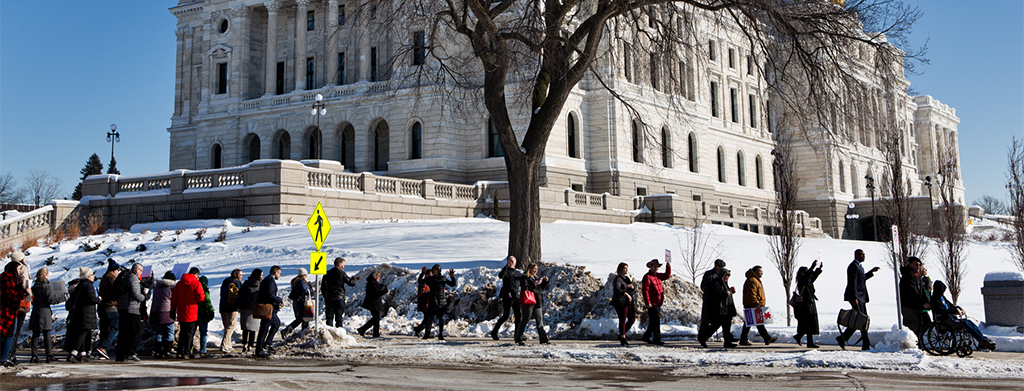
This week, Governor Walz’ Administration released their budget proposal for the next biennium. It highlighted significant investments in many different programs for Minnesotans with disabilities. First, the Governor proposed an investment in the Minnesota Council on Disability through a budget increase. This is to support the Council’s work and maintain current operations in an environment with increasing costs.
In conjunction with the Governor’s budget, Commissioner Jan Malcom with the Department of Health released draft legislation related to the licensure of assisted living facilities (PDF). The Governor’s budget calls for a dramatic expansion of the state’s ability to fight abuse and neglect of Minnesota’s elders who live in care facilities across the state. The proposal supports a $62.5 million investment over the next four years to expand consumer protections and increase the enforcement powers of the state. It also calls for licensure of assisted living facilities. The proposal calls for a higher level of accessible rooms in newly licensed facilities. The Council will be working with the Department of Health, Governor Walz’s team, Senator Housely and Representative Schultz and Olson to bolster accessibility standards in these facilities.
The Governor’s budget also called for a $1.5 billion transit package to provide comprehensive investment in multi-modal transportation. The plan calls for Metro Mobility to be moved to its own separate budget that prioritizes service for people with disabilities. By doing so, the Metro Mobility service will no longer compete with the bus system for resources. The package also calls for investment in the consumer experience, notably enhancing accessibility for sidewalks, snow removal, and signage.
The Council testified in support of HF 803, authored by Rep. Fischer. This act calls for a working group to develop recommendations for providing notice to business owners regarding compliance with the Americans with Disabilities Act. As the bill currently states, the Council on Disability would be a member of the working group. As our agency communicated with the chief author and the Department of Labor and Industry, it became clear that the Council should serve as the host of the working group to ensure the conversation is framed in the context of civil rights enforcement. The bill passed committee and will head to Ways and Means.
Finally, Disability Day at the Capitol was a smashing success. Attendance was high with several hundred Minnesotans with disabilities advocating for inclusion and independence. The Council on Disability held a Council meeting at the Capitol coinciding with this day. Our Councilmembers were eager to meet with their elected representatives and share disability policy issues in their community. It was a highly successful day.
The Minnesota Council on Disability exists to serve people with disabilities in Minnesota through development of effective policy, training, technical resources and collaborations with public and private stakeholders. Any policy inquires can be directed to Public Policy Director Kody Olson at kody.olson@state.mn.us.